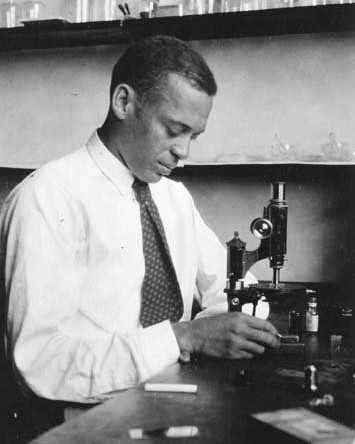Dr. Ernest Everett Just - Pioneer of Cell Biology
Born: August 14, 1883, Charleston, South Carolina, U.S.A.
Died: October 27, 1941, Washington, D.C., U.S.A.
Ernest Everett Just was a pioneering scientist whose discoveries about cell membranes and fertilization reshaped biology and overcame barriers of racial injustice.
Ernest Everett Just , known as E.E. Just, was born on August 14, 1883, in Charleston, South Carolina, was an African American scientist who made important discoveries about cells and life. As a child, he loved walking in the woods with his grandfather and learning about plants and animals. His grandfather shared stories and explanations about nature that fascinated Ernest and taught him to pay close attention to small details. These early experiences made him curious about the world and inspired him to study science.
E.E.’s early schooling was limited because Black children in the South had few good schools. To learn more, he spent hours exploring beaches and marshes near his home, collecting plants and animals and watching how they lived. When he was 16, his mother sent him to New Hampshire, where he studied at Kimball Hall Academy. There, he learned biology in a proper school and did very well. He discovered he loved experiments and carefully recording his observations, skills that would later make him a great scientist.
He went to Dartmouth College and studied biology and history. He became especially interested in the eggs of sea animals and how cells are built. E.E. was a top student, won many awards, and graduated with high honors. But he was not allowed to give the graduation speech because he was Black. The school worried that it might upset white students and their families. This was one of the many times Ernest faced racial discrimination in his life, even when he had proven himself to be the best in his class.
After college, he could not get a job at white colleges. He started teaching at Howard University, where he later became the head of the Zoology Department. He also worked on a PhD at the University of Chicago and spent summers at the Marine Biological Laboratory in Massachusetts. Although the lab gave him chances to work, he wanted to go abroad to escape discrimination in the United States. He believed he could do better science and be treated fairly if he worked in Europe.
E.E. earned his PhD in 1916. Even with his many discoveries, he had to stay at Howard because other schools would not hire him. During this time, he studied cells in marine animals and made major discoveries. He found that the cell membrane of eggs is not just a wall around the cell, but an active part that helps form tissues and organs. This showed that cells are much more complex and interesting than many scientists had thought.
His most famous discovery was about fertilization. He showed that eggs split in different ways depending on where the sperm enters. Since sperm can enter anywhere, the splitting is not fixed. This idea went against what many scientists believed at the time, but it later became very important in biology. His discoveries helped people understand how life begins and how cells develop into tissues and organs.
E.E. wrote books about biology, including The Biology of the Cell Surface, which is still read today. He worked in Europe where he could do his research more freely. He taught at schools like the Sorbonne in France and the Kaiser Wilhelm Institute in Germany, while also teaching at Howard for 30 years until he died in 1941. He continued to encourage young scientists and students, showing them that careful observation and curiosity are key to discovery.
His work was honored by the NAACP, which gave him the first Spingarn Medal in 1915. He was later awarded the National Medal of Science in 1990. Ernest Everett Just’s courage, creativity, and research continue to inspire scientists. He showed that talent and hard work can overcome unfair obstacles. His life reminds us that determination and curiosity can change the way people understand the world, even when the odds are stacked against you.
References:
Byrnes, W Malcolm. “E. E. Just and Creativity in Science. the Importance of Diversity.” Journal of African American Studies (New Brunswick, N.J.), U.S. National Library of Medicine, Sept. 2015, pmc.ncbi.nlm.nih.gov/articles/PMC4548984.
“Ernest Everett Just - Accomplishments, Death & Facts.” Biography, biography.com/scientists/ernest-everett-just.
Keywords:
Science, Innovation, Courage, Perseverance, Achievement, Self-reliance, Challenge Injustices, Make a Difference, STEAM
Explore ARTEFFECT projects about this Unsung Hero:
Ernest Everett Just Artworks
- Collections: Art Gallery, Unsung Heroes

